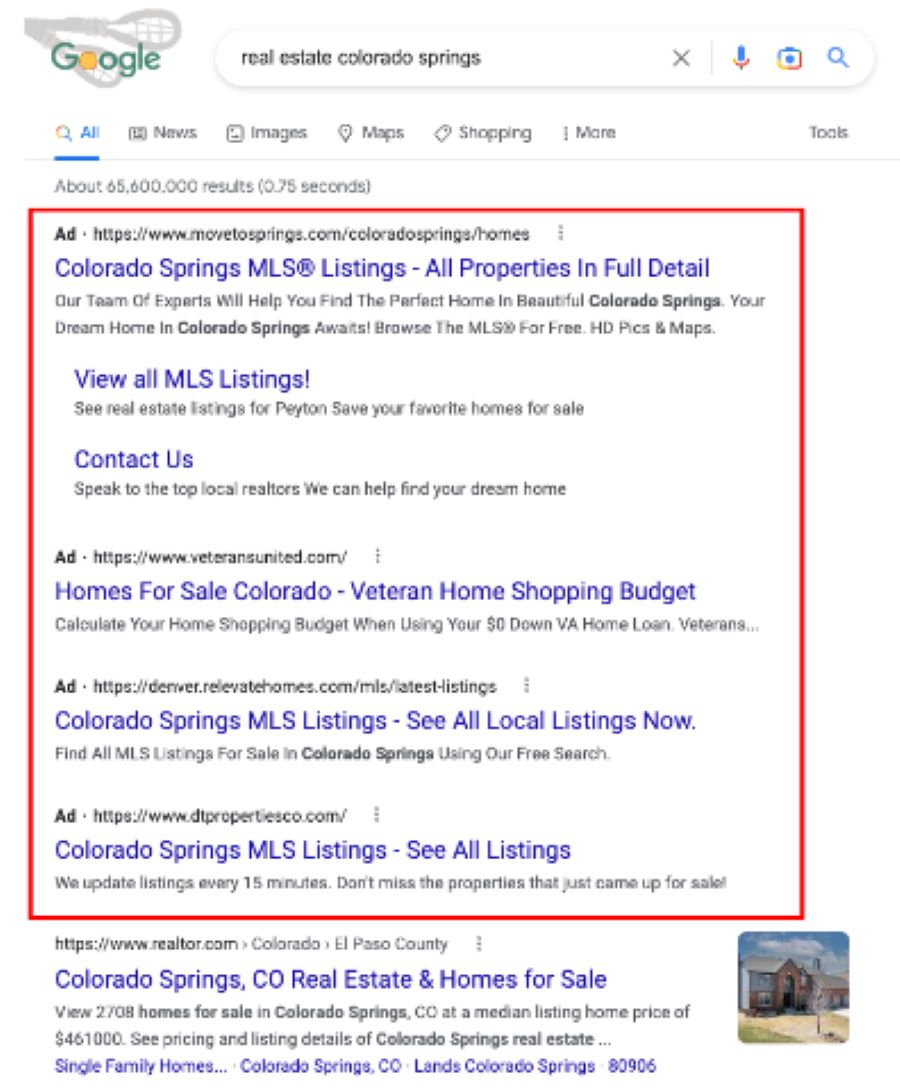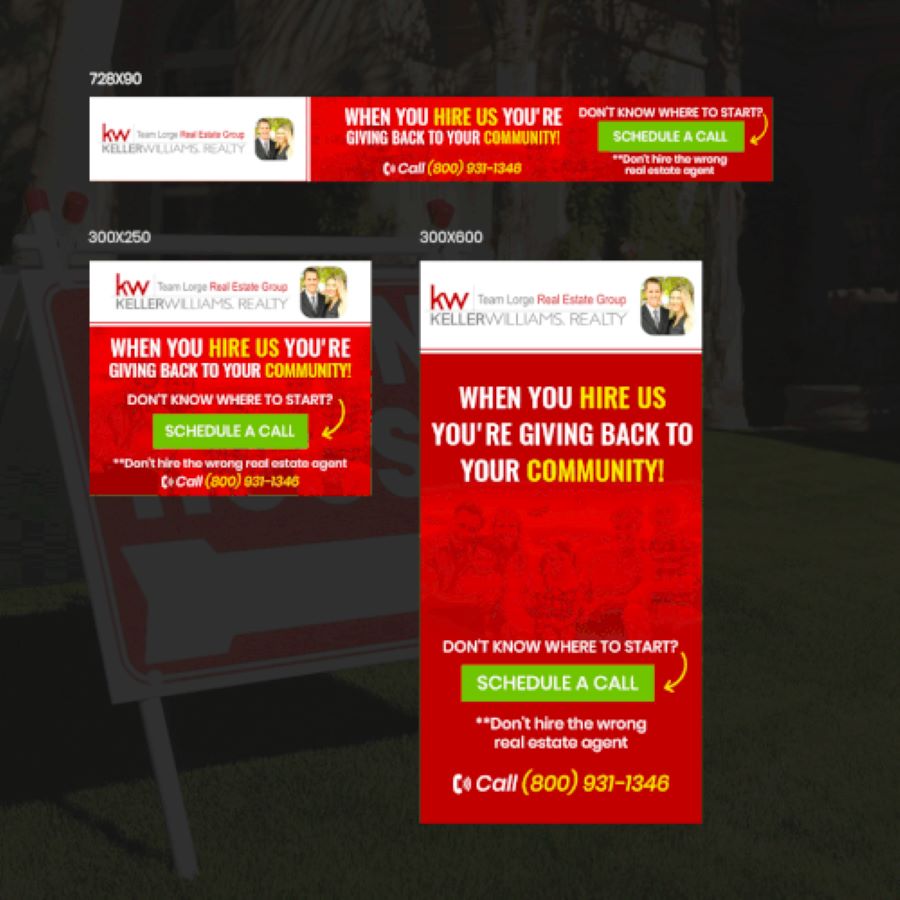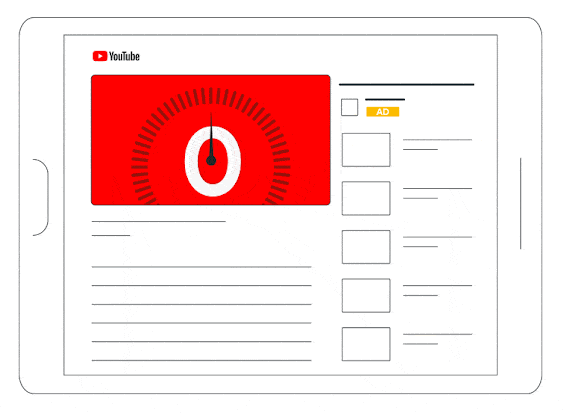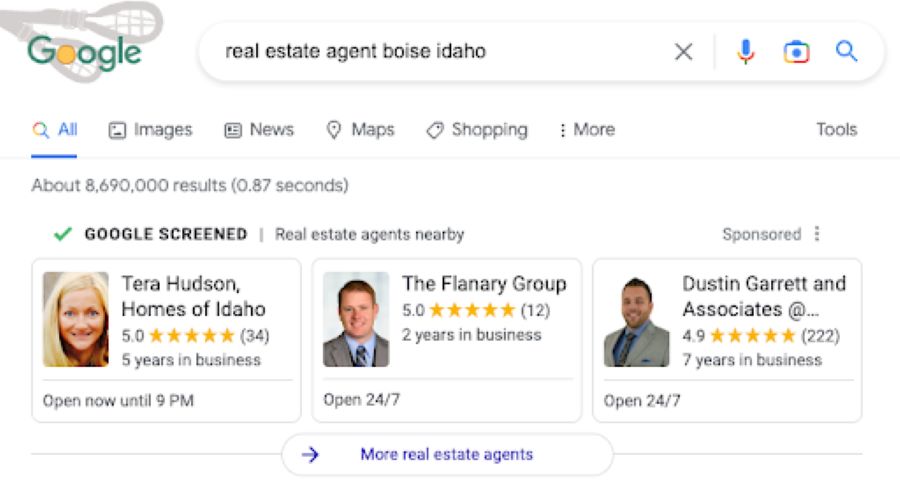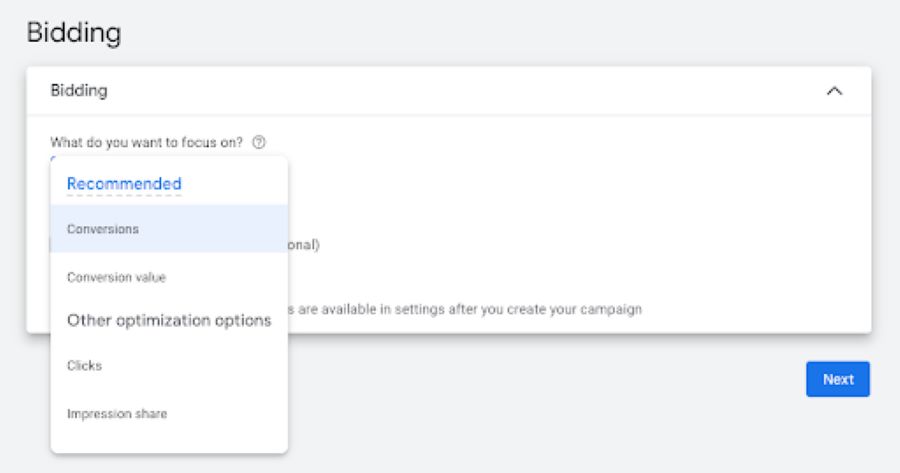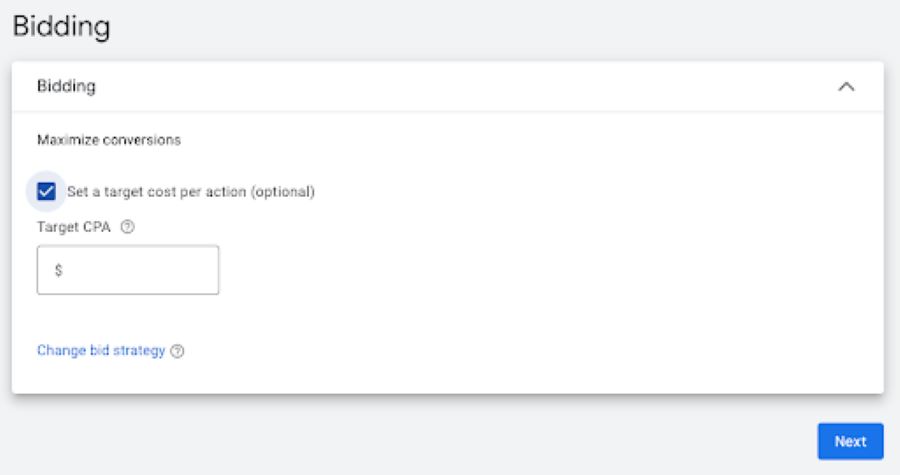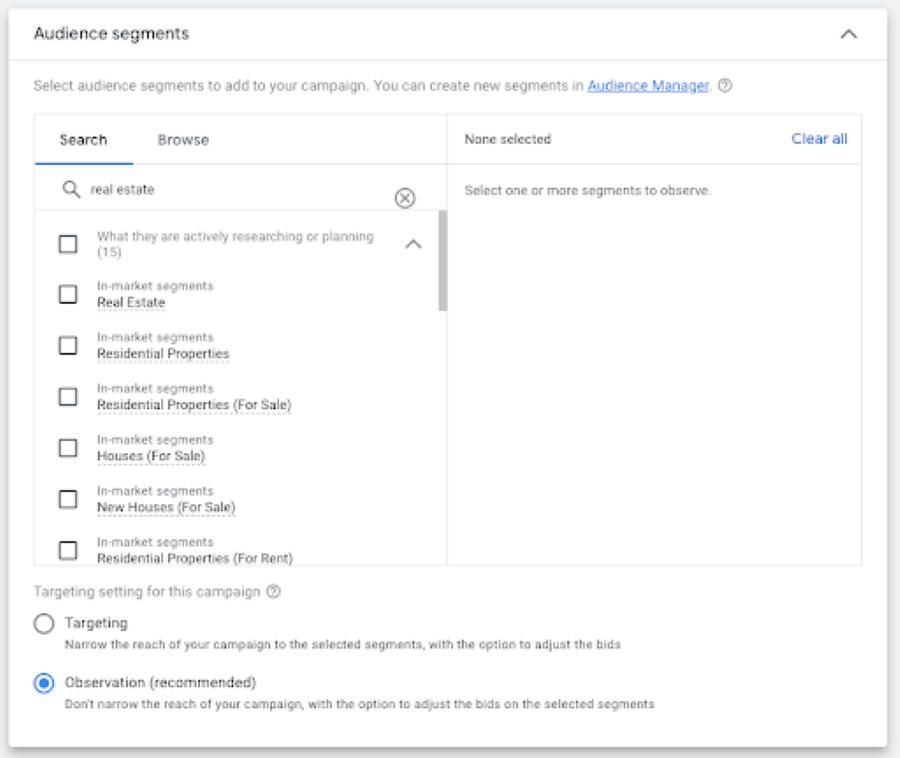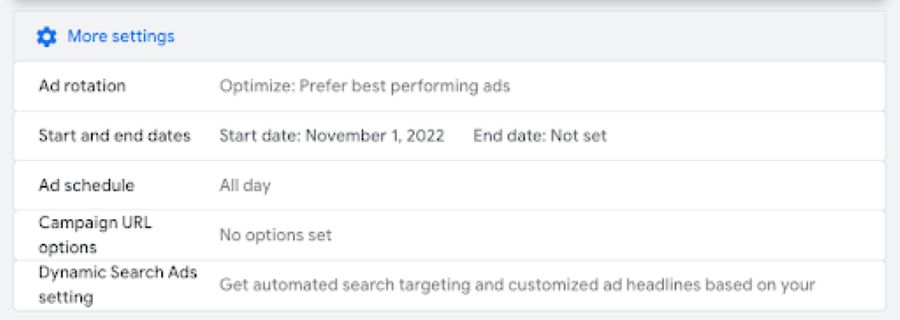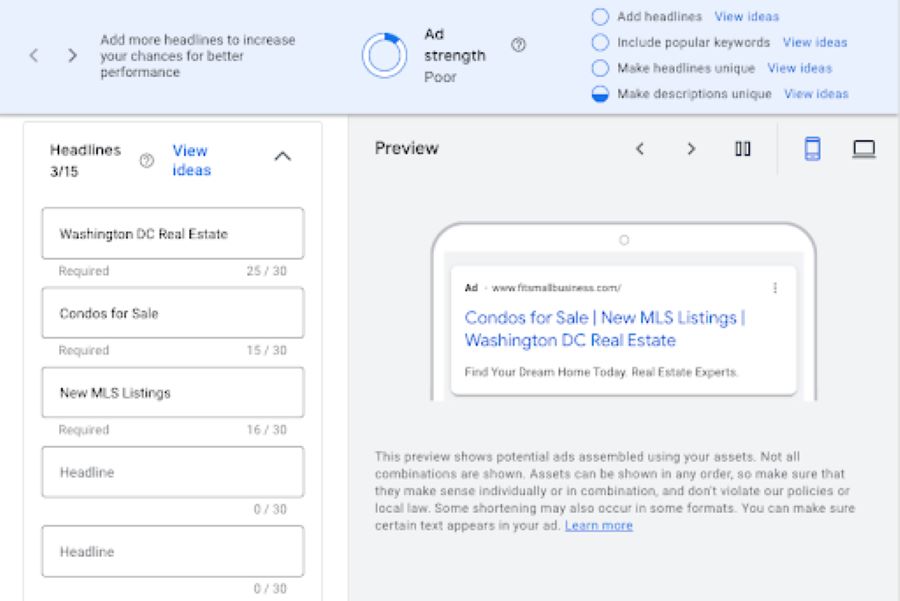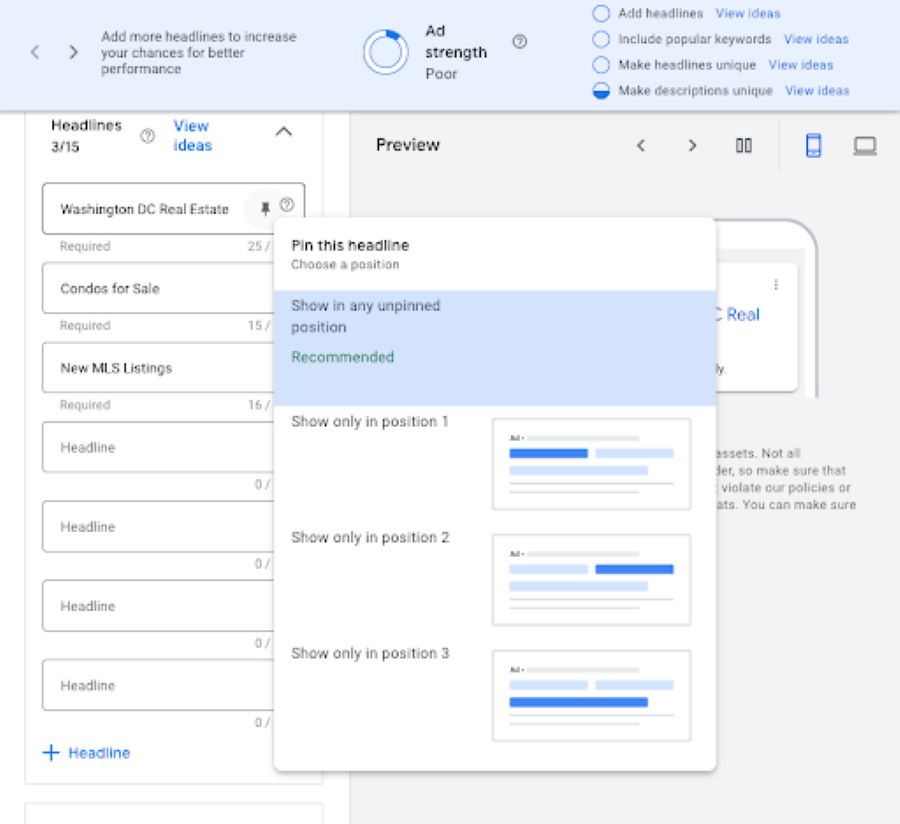Google Ads is a powerful tool for real estate professionals to generate leads, build brand authority, and grow their businesses. To successfully use Google Ads for real estate agents, it’s important to understand the types of Google Ads available to you and the best strategies to maximize your campaigns. This will put you on the fast track to generating real estate leads from Google.
To maximize the profitability of your Google Ads, you need the right tools to strategize, optimize, and track your ad’s performance and your new leads. We recommend using the expertise of a full-service client relationship management (CRM) and advertising platform like HubSpot. HubSpot’s landing pages, analytics, and lead nurturing tools will help you reach more clients and increase your return on investment (ROI). Plus, you can try it out for free.
1. Understand the Types of Google Ads
To effectively use Google Ads for real estate leads, start with a clear understanding of the different types of ads and which are most effective in real estate. Google Ads can actually describe an extremely wide range of ad types, which include the following:
- Search ads
- Display ads
- Video ads
- Local services ads
- Discovery
- Performance max
- Shopping
In the real estate industry, the four primary types of Google Ads that are used are search, display, video, and local services. These target users who are actively searching for real estate-related content. This makes Google Ads ideal for real estate agents and brokers who want to target buyers and sellers ready to transact. It also means the success of Google Ads is dependent on your understanding of keywords because you don’t get the opportunity to add photos or videos to your ad.
Real estate professionals often use Facebook ads in conjunction with Google Ads. To understand the difference between the two, read our guide: Facebook Ads vs Google Ads.
2. Determine Who Your Target Customer Is
If you’ve been working as a real estate professional, you know that not all leads are equal. However, with a thorough real estate lead generation strategy and an understanding of the targeting capabilities, Google pay-per-click (PPC) for realtors can provide incredibly high-quality leads. The more specifically you target your campaign, the more likely your leads will be lucrative for your business.
Your targeting choices will heavily impact how much money you pay for your ad campaigns, click-through rates, and conversions. Although targeting a highly specific audience means that Google will show your ad to a smaller number of people, the right targeting will be more profitable and produce a better ROI. This ultimately saves you money and increases your client base and income.
Here are the ways you can target your audience in Google real estate ads:
- Demographic: Decide whether to limit your audience by age, gender, household income, parental status, or a combination.
- Affinity audiences: Target audiences based on what they have demonstrated interest in through online searches, shopping habits, and what videos they watched on platforms like YouTube.
- In-market: Show your Google real estate ads to users who search for related products or topics.
- Custom segments: Enter relevant keywords, URLs, and apps to create a custom segment for your ads.
- Life events: Target users in the middle of key life events, like moving homes, moving long distances, getting married, or getting a divorce.
- Your data: Formerly known as “remarketing,” your data segments include people who have previously interacted with your ads or website. This section also includes similar audiences or people who are interested in related topics.
- Location targeting: Show your ads only to users within a specific geographic area, a particularly important targeting feature for real estate agents.
As you create your Google real estate advertising strategy, keep in mind that your targeting options vary based on the type of ad campaign you run. For example, display ads are the only Google ad type to allow every targeting option. Search and video ads provide most of the options, but you need to be well aware of your limitations to plan the most effective campaign.
Here’s a breakdown from Google of the targeting capabilities of each ad type:
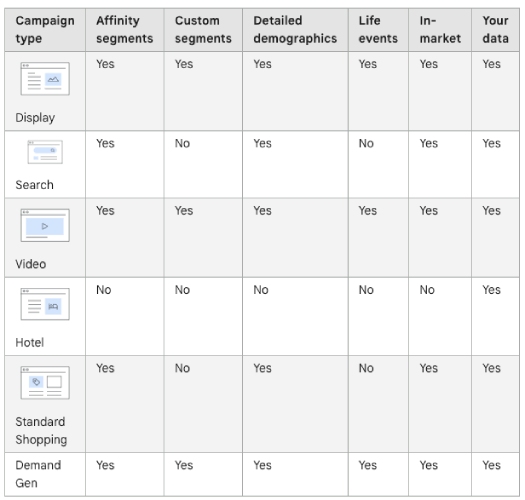
Targets available per campaign type (Source: Google)
In general, display and search ads are the most common and most fitting for real estate professionals, with video as a close third. Display and video ads have the most versatile targeting capabilities, and search ads appear when users are actively seeking answers. This means that, by nature, search ads automatically target users who are more likely to convert to clients.
3. Strategically Choose the Right Keywords & Copy
The majority of Google Ads for real estate are search ads, which consist of just a few lines of text, including a headline and description. With such a limited amount of space, it’s critical that you choose the right language and keywords to target the right audience. PPC for real estate should highlight exactly what the users are searching for.
For example, someone searching “houses for sale in Maryland” is not going to click on an ad that says, “Award-Winning Realtors.” However, they are likely to click on a heading with the exact keyword or a variation, like “Maryland real estate & homes for sale.” The real estate Google ad examples below include additional keywords in the description that prove that they offer the solution to the searcher’s question, like “interactive maps,” “sales history,” “active homes for sale,” and “real estate filters.”
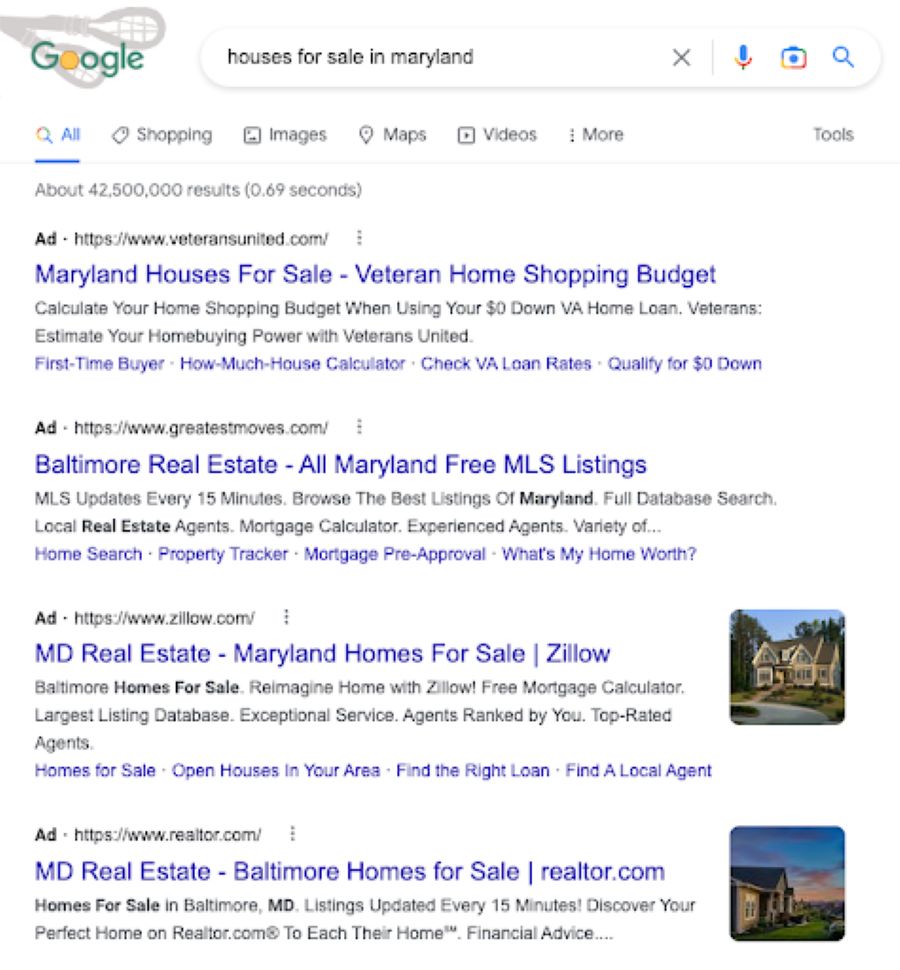
Example Google Ad with headline and descriptions (Source: Google)
Searching & Selecting Keywords Strategically
If you’re new to the world of real estate advertising, most of the real estate-related keywords may seem like great choices. However, by thinking more in-depth about the search intent of individual keywords, you’ll target clients based on how ready they are to buy or sell. For example, someone searching for “homes in New Orleans” could be looking to purchase a home, but they could also be searching for information about the types of houses in this area, home prices, home styles, and so on.
On the other hand, choosing the keyword “homes for sale in New Orleans” puts your ads in front of people who are likely much closer to making a purchase. Finding the best real estate keywords will make or break your ad’s success. Make sure you also consider the following information when choosing the right keywords for your campaign:
- Determine negative keywords to avoid: Negative keywords are terms you don’t want to rank for, like “Washington City” if you work in Washington state.
- Include long-tail keywords: Phrases with at least three to four words with a more specific search intent (e.g., “Three bedroom homes in Denver” instead of “Denver homes”). Include descriptive real estate words to target a specific audience.
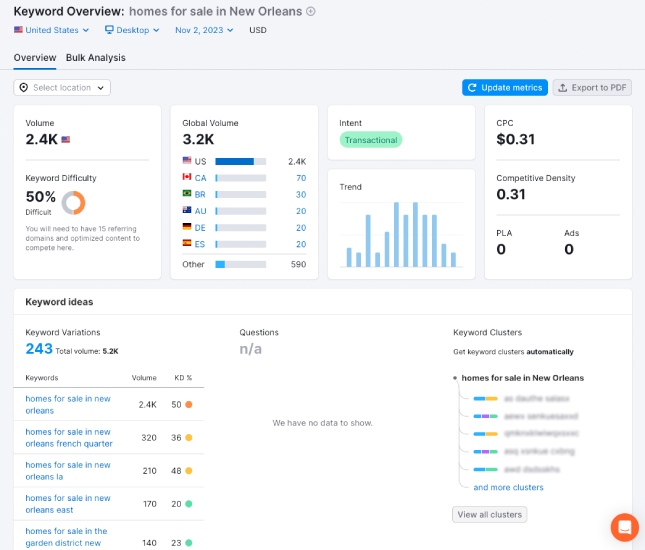
Sample real estate keyword overview (Source: SEMrush)
Ultimately, keyword research is arguably the most important step in creating strong Google Ads for real estate agents. You can do basic research with Google’s free keyword planner tool, but using a search engine optimization (SEO) platform like Semrush is easily the most effective way to maximize your advertising return on investment (ROI). Semrush provides detailed keyword overviews, including average search volume, competition, and average cost-per-click (CPC), as well as additional keyword ideas and analyses of the current search results.
4. Establish Key Performance Indicators (KPIs) for Your Google Real Estate Ads
KPIs define the way that you measure your real estate ads, analyze the data, and determine what is successful or unsuccessful in your campaigns. To maximize your return on investment and find new clients online using Google Ads, set and understand your KPIs as they relate to your specific goals.
These are some of the most important KPIs for your Google real estate ads and campaigns:
- Impressions: Every time your ad is shown to someone in online search results, it counts as an impression. This helps you see how wide your ad’s reach is.
- Click-through rate (CTR): When someone sees your ad in search results and clicks on it, it counts toward your click-through rate. The goal of Google Ads for real estate is always to have a high CTR—indicating that your ad’s copy matches the user’s search intent and is grabbing their attention.
- Conversion rate: After someone clicks on your ad, they should be taken to your website or real estate landing page, where you then ask them to take another action like signing up for a home valuation or new listing updates. When they do this, it’s considered a conversion. The higher your conversion rate, the more leads you generate and the more money you make.
- Cost-per-click (CPC): Your CPC is how much you pay each time someone clicks on your ad. This is not fully in your control, since the amount of competition for a keyword can drive up the cost of ad placement. However, the goal is to minimize your CPC and maximize conversions. Fortunately, you can set caps on how much you are willing to pay for a click and your campaign overall.
- Cost-per-action (CPA): The CPA is a digital advertising payment model that charges you only for a specific action taken by a visitor. For example, downloading a document or signing up for a newsletter.
- Impression and impression share rates: These metrics show the percentage and rate of total impressions coming from the top of the search engine results pages (SERPs) where your ad is displayed. While you definitely want high impression rates, you also want a high impression-to-click and impression-to-conversion rate. Otherwise, it means your ad is getting seen but not engaged.
- Quality score: Google ultimately wants to present its users with the best-quality content on all its platforms. Even if you pay more for your ads than your competitors, Google won’t optimize your ads in searches if they have a low-quality score, so they’ll be displayed less, and at lower positions.
If you start using Google real estate advertising without understanding your performance metrics, you’ll inevitably waste time, money, and effort. Knowing how to analyze and improve KPIs helps you create effective ads that are fully optimized from the get-go, ultimately helping you become successful in real estate. It will also help you understand your data, adjust your ads, and improve your return on investment more quickly.
5. Input Your Real Estate Ad Data & Copy
Once your ad is planned and your copy is written, it’s time to set up your Google real estate ads. Creating an account is simple, and Google will lead you through the steps of creating your ad. However, make sure you pay attention to every detail within your ad settings so you don’t miss an important feature.
In your Google Ads account dashboard, click “New Campaign.” The first screen will ask you to choose your campaign objective. Carefully consider your options here, because this choice will determine the rest of the steps and settings provided by Google.
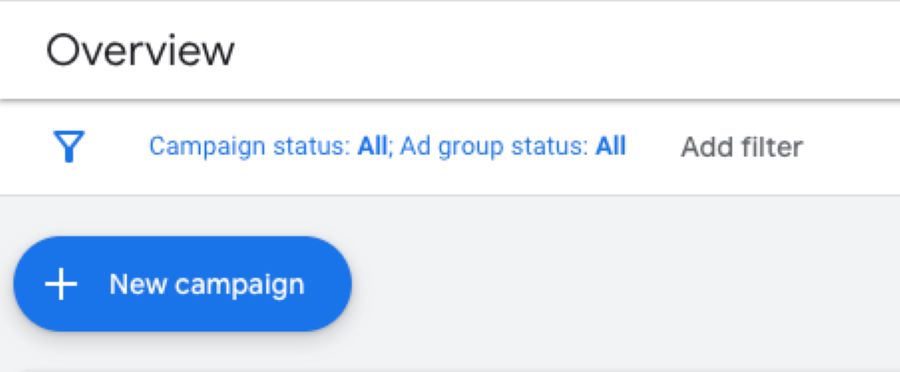
Start a new Google ad campaign (Source: Google)
The obvious goal of most Google ads for real estate agents is to generate leads. However, you will have several options to choose from:
- Sales
- Leads
- Website traffic
- App promotion
- Awareness and consideration
- Local store visits and promotions
- Create a campaign without a goal’s guidance
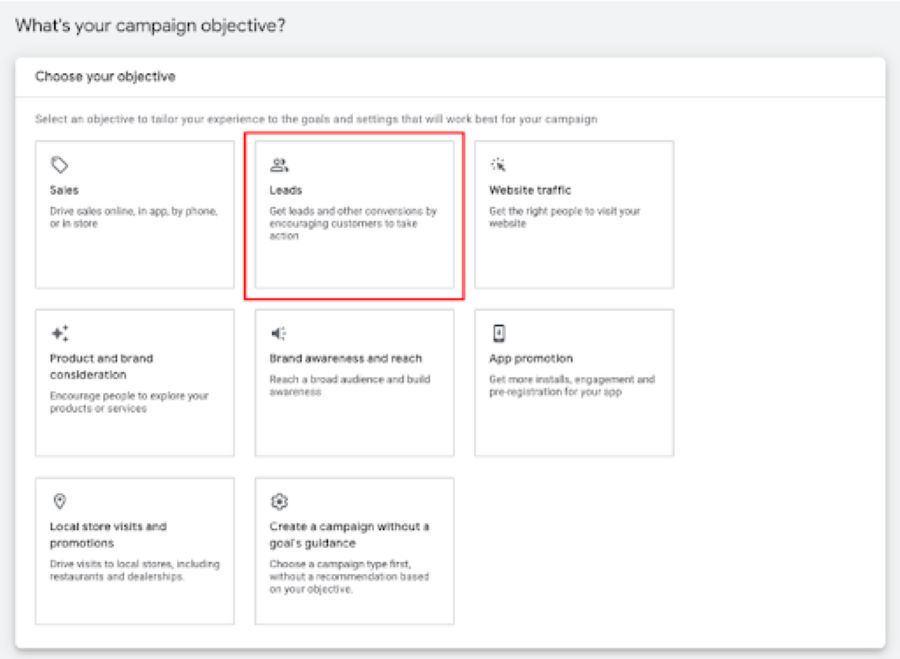
Campaign objective options (Source: Google)
A new box will appear on the screen, asking you to define your conversion goals. This will help Google Analytics track users’ activity and determine how many users are taking the action you present to them.

Decide on your ad conversion goal (Source: Google)
The next screen will prompt you to select which type of real estate Google ad you want to create. This choice will impact the following steps since your ad settings vary considerably depending on the type. Since search ads, or pay-per-click (PPC) ads, are generally the most common for real estate agents, those are the settings we’ll continue to walk through.
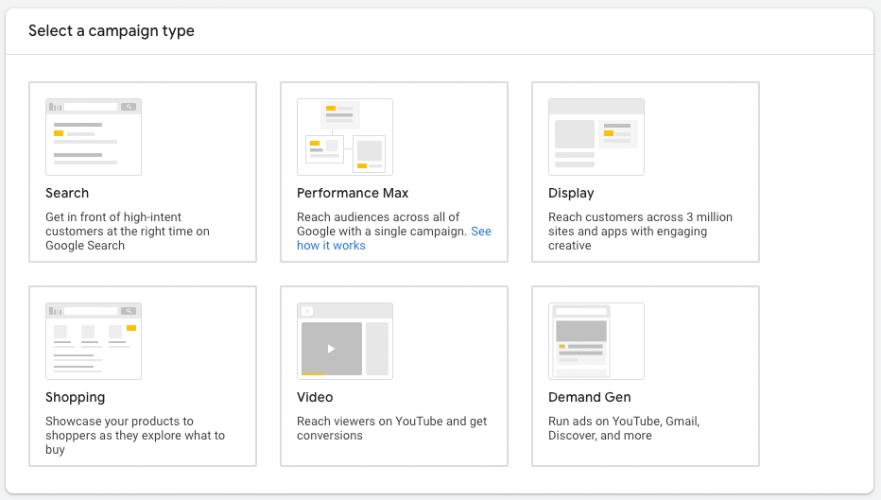
Choose campaign type (Source: Google)
Once you make this choice, a new box will appear, asking you to select the ways you’d like to reach your goal. You can check as many boxes as you need, although the most common strategy is using a lead form submission on a landing page or website.
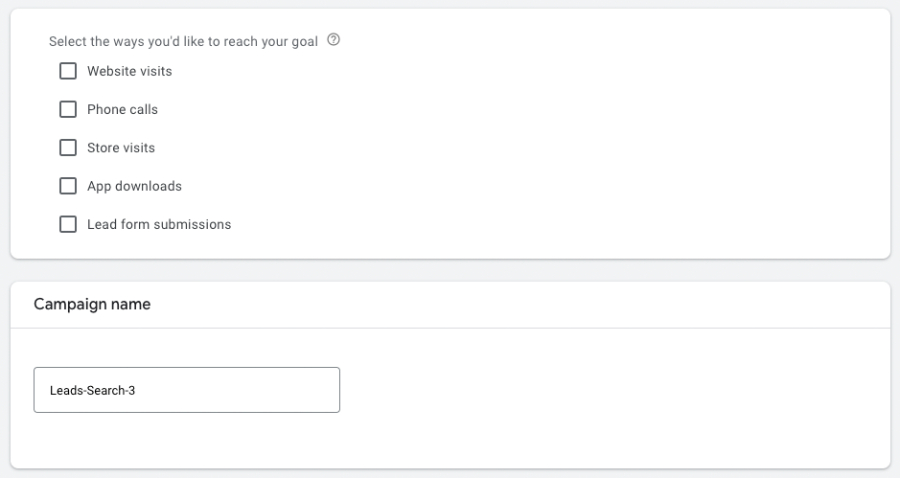
Options to reach your ad goal (Source: Google)
The next screen will begin setting up your bidding options. Choose to bid by conversions, conversion value, clicks, or impression share. Your bidding strategy should be based on your primary goal for customers, following this general guideline:
- Conversions/conversion value: If your goal is for customers to take direct action on your site (best for most agents wanting to generate leads)
- Clicks: If you want to generate traffic to your website
- Impressions: If your primary goal is to increase brand awareness
Depending on which option you choose, you will also be presented with the option to set a target cost-per-action, maximum cost-per-click, or target return on ad spend.
Next, you’ll be prompted to choose your campaign settings. This is where you decide if you want to focus on PPC ads that appear in search results or if you also want to tackle display ads that appear across the internet.
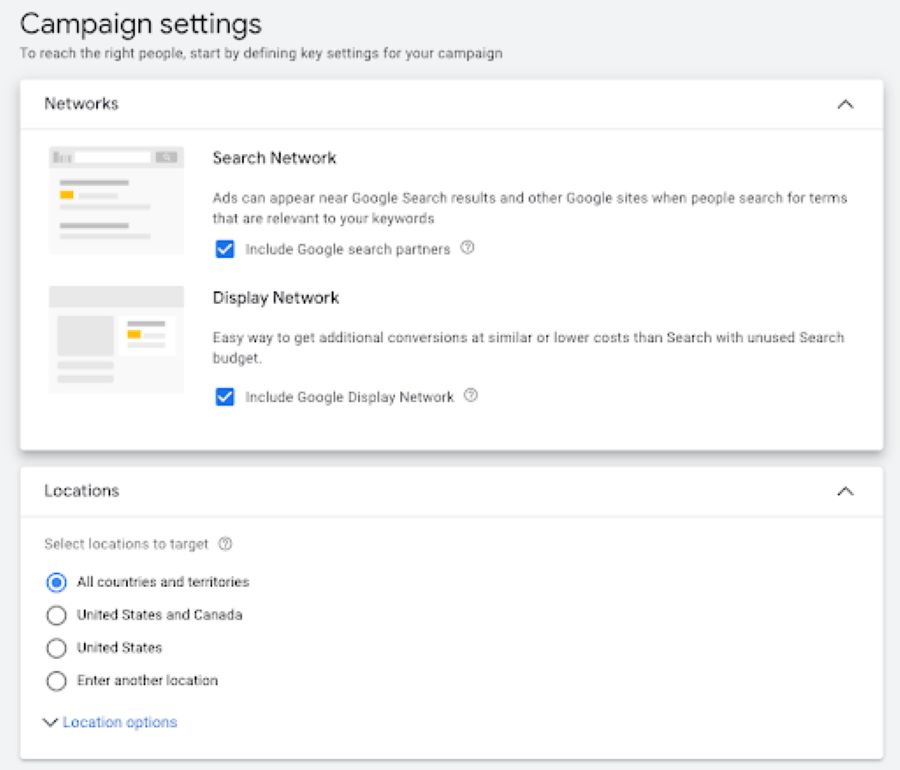
Choose location and campaign settings (Source: Google)
This step also includes defining your audience segments as well as additional settings like your ad schedule, start and end dates, and ad rotation. Defining your audience segment will depend on your business and niche, as well as each individual ad campaign you create. For example, your audience for listings might be “residential properties (for sale),” while ads targeting new listing clients may be “homeowners.” The amount of time you run each ad will also depend on your goals, budget, real estate market, and the season.
Next, Google will prompt you to input your ad copy. If you haven’t determined your ideal keywords, there is an option to scan an existing URL and search for potential keywords. However, we recommend doing this research beforehand on a tool with more comprehensive data, like Semrush.
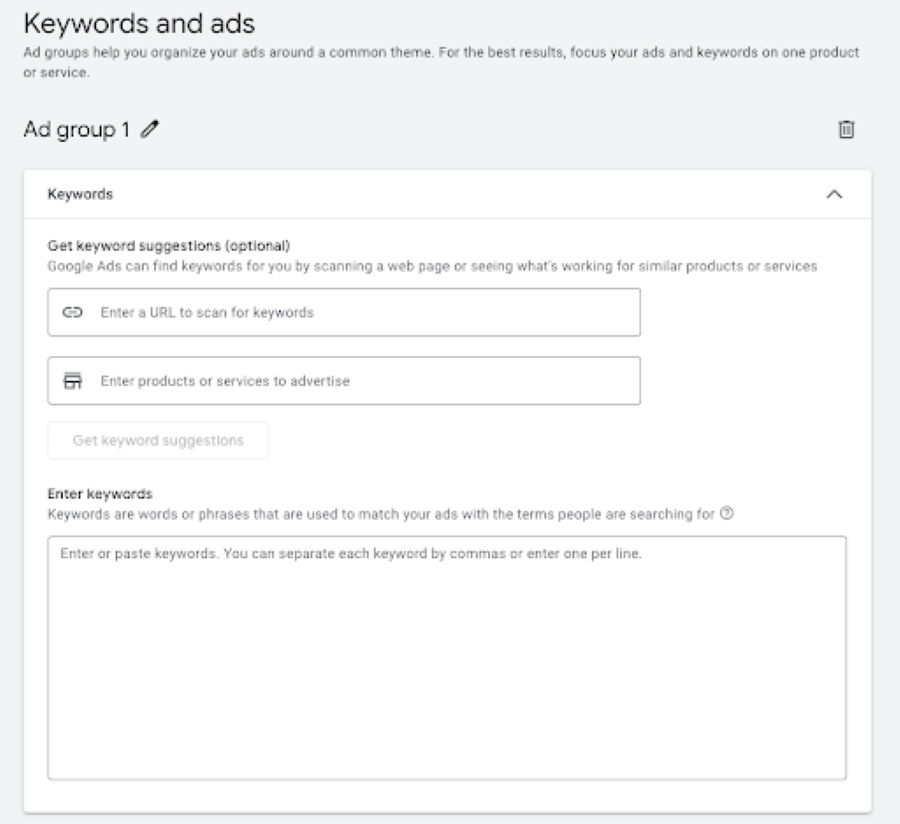
Enter target keywords and copy (Source: Google)
With your keywords ready, input your ad copy and URL into the Google Ads platform. It will give you a mobile and desktop preview of the way your copy will appear to users and automatically generate recommendations and an “ad strength” score. You are required to input a minimum of three headlines and two descriptions, although you can add more of each. Headlines are limited to 30 characters, and descriptions are limited to 90.
Keep in mind that Google will automatically place your headlines and descriptions in a different order, depending on the individual user and search term. As you input your copy, make sure that all of your headlines and descriptions can be used interchangeably. However, if you strongly prefer one of your headlines and descriptions, you can “pin” it to include it in all of your ads or specific positions.
The last step of creating your real estate Google ad is to set your budget. Determine the average amount that you are willing to spend per day, but remember that the actual costs can vary. The average cost-per-lead (CPL) for the real estate industry is $44.70, so in order to generate one to two leads per day, you may want to set your daily budget at about $100. However, your average CPL will depend on your ads, audience, and local market, so this can vary drastically.

Set your Google ad budget (Source: Google)
6. Establish a Real Estate Lead Generation Funnel
Whether you’re using Google ads or real estate Facebook Ads, you need a lead generation funnel in order to take a user from clicking on your ad to becoming your newest real estate client. This means providing a way to capture users’ contact information and nurture a relationship with them.
Two of the best ways to generate leads with Google Ads are the following:
- Real estate website: This establishes an authoritative presence for all your marketing, and is especially useful for users who find you through Google Ads. Plus, having an IDX website allows viewers to browse listings on your website.
- Real estate landing pages: Landing pages are a subset of real estate websites and are particularly important because they’re one of the main factors in Google’s quality score for your ads. Google only wants to direct its readers to pages that are closely aligned with the user’s search intent, so landing pages should be highly targeted to your ads.
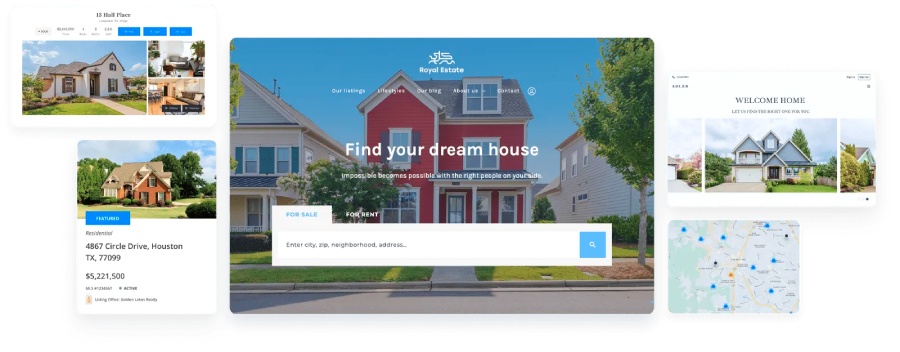
Placester real estate website template example (Source: Placester)
With the right real estate website builder, you can have a website or landing page published in a matter of hours. For instance, Placester provides premade real estate website templates, a code-free drag-and-drop editor, and built-in SEO tools. These features make it easy for you to create a professional website that generates leads from your Google ads.
7. Analyze Data & Make Tweaks
Data and analytics are essential pieces of all successful real estate ads. Studying your analytics and understanding your KPIs will help you identify opportunities to improve your ads, maximize your ROI, and ultimately generate more leads and scale your business. You can learn how to analyze data using the Google Ads dashboard.
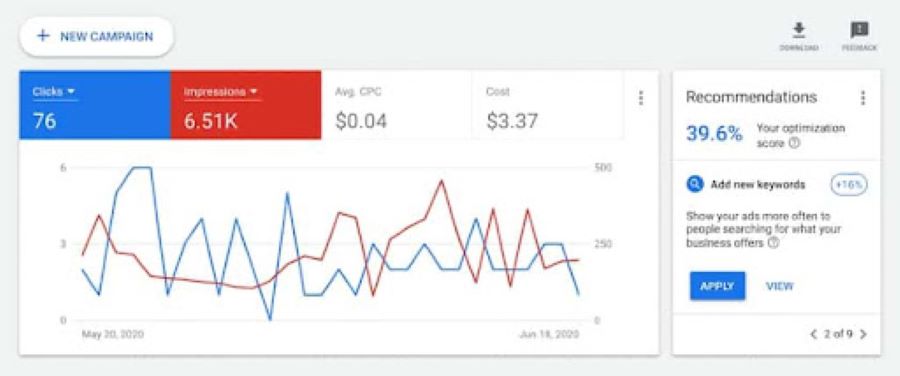
Analytics breakdown on the Google Overview page
Here are a few changes you can make based on your KPIs:
Key Performance Indicator (KPI) | Industry Average Rates | Changes You Can Make |
|---|---|---|
CTR (Click-through rate) | Low click-through rates point to problems in your ad copy or targeting. | |
Conversion Rate | If your click-through rate is around average, but conversions are low, it means users aren’t confident enough to hand over their personal information. Use this information to tweak the content on your landing page or re-examine your keyword and user intent. | |
CPC (Cost-per-click) | You can’t change this number directly, but you can decrease it by making changes based on other data, like improving your quality score or adjusting your keywords. | |
CPA (Cost-per-action) (also referred to as cost-per-lead) | A CPA is typically higher than your CPC. Try decreasing your CPA by making changes to your offer or lead form. | |
Average Impression Share | N/A | To get more impressions, try increasing your bid, changing your keywords, or making other changes to improve your quality score. |
Quality Score | N/A | If your quality score is low, check your Google Ads dashboard to see which component is in need of improvement. Consider making changes to your ad or landing page accordingly. |
Even if your first real estate Google Ad gets only mediocre results, use this data to make strategic changes. These changes can significantly improve the effectiveness of your ads, so make it a point to review this data frequently while running your real estate ad campaigns to optimize your results.
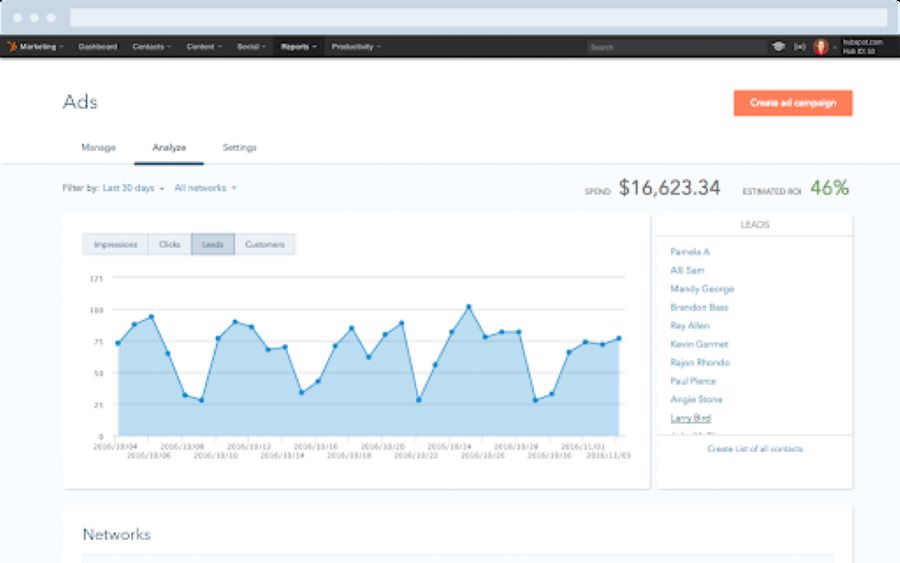
Visual Google Ads analytics in HubSpot (Source: HubSpot)
If you don’t feel confident in your ability to optimize and manage your own ads, consider working with HubSpot to supplement many areas of your marketing strategy. HubSpot provides an easy-to-use Google ad creator that automatically makes optimization recommendations and shows visual reports about your ad’s performance. It also connects to the comprehensive and user-friendly HubSpot CRM, making lead nurturing more automatic, easier, and effective. Start using HubSpot for free today.
Why Google Ads Are Beneficial for Real Estate
There are many valuable benefits for real estate professionals to use Google ads. They provide a powerful and affordable way to reach a limitless audience, as well as incredibly detailed targeting options. In addition, Google ads are highly measurable, enabling real estate professionals to track performance and make data-driven decisions. Each real estate lead can generate thousands of dollars in profit, and Google Ads is a powerful tool to find these leads for an affordable price and with the highest level of feedback.
Here are a few statistics that reflect the power of Google ads for real estate:
- The average click-through rate of Google ads in 2023 is 6.11%, but the real estate industry average is 9.09%.
- The average cost-per-click (CPC) in real estate is only $1.55, which is significantly lower than the overall average of $4.22.
- The average cost-per-lead from real estate Google ads is $66.02.
- 57% of all website visitors come from organic and paid searches.
- The average conversion rate of paid search is 1.5%.
- 75.4% of homebuyers who click on an ad will pick up the phone.
Frequently Asked Questions (FAQs)
Google Ads provides a range of targeting options that enable real estate professionals to effectively reach a highly specific audience, whether it’s based on their farm area, demographics, or a real estate niche. Its results are also highly measurable, so agents can gain valuable insights into their audience and return on investment (ROI). Ultimately, Google ads for real estate agents are extremely powerful for marketing and lead generation.
Google Ads uses a unique bidding system for its ads, so there is no way to calculate a flat fee for advertising. However, the average cost-per-click in the real estate industry is only $1.55, significantly lower than most professional industries.
Google Ads provides many different options to target your real estate audience, whether you want to generate buyer leads or seller leads. Targeting includes choosing the right keywords, targeting audience location and demographics, remarketing, and even uploading your contact list.
Bottom Line
Using Google Ads for real estate is an incredibly powerful way to grow your real estate business, whether you’re looking to generate leads, build brand authority, or scale your business. By strategically targeting and optimizing your real estate Google Ads, you’ll be able to save time and energy in your marketing efforts and increase your ROI.
